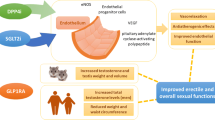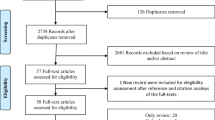Abstract
Sexual dysfunction has a high prevalence among hypertensive men, and hypertension per se, regardless of drugs, has been suggested to affect sexual function. The available studies have not clarified which factors play a major role in the pathogenesis of sexual dysfunction in hypertensive men. Neurovascular factors, however, seem to be especially important, (in particular defective nitric oxide activity), although hormonal and psychogenic factors cannot be excluded. Further studies are needed to answer the important question of whether erectile dysfunction seen in hypertension may be one expression of vascular disease and target organ damage. The incidence of sexual dysfunction is exacerbated by antihypertensive drug treatment. There is evidence that some classes of drugs, such as diuretics, centrally acting sympatholitic drugs, and â-blockers have a greater impact on sexual function than other classes, such as calcium antagonists and angiotensin converting enzyme inhibitors. Present evidence on the effects of angiotensin II antagonists is limited, but some data suggest that sexual function in men receiving these drugs not only is not altered, but even improves. Since sexual function is an important aspect of quality of life for the individual, it is important in treating hypertension to ensure that the drugs used have the lowest possible potential for causing sexual problems. This ensures the best balance between therapeutic efficacy and quality of life, which is essential for compliance.
Similar content being viewed by others
References and Recommended Reading
Bansal S: Sexual dysfunction in hypertensive men. A critical review of the literature. Hypertension 1988, 12:1–10.
Bulpitt CJ, Dollery CT, Carne S: Changes in symptoms of hypertensive patients after referral to hospital clinic. Br Heart J 1976, 38:121–128.
Bauer GE, Hunyor SN, Baker J, Marshall P: Clinical side effects of antihypertensive treatment: a placebo-controlled, doubleblind study. Postgrad Med Comm (Special report) 1981, 49–54.
Croog SH, Levine S, Sudilovsky A, et al.: Sexual symptoms in hypertensive patients. A clinical trial of antihypertensive medications. Arch Intern Med 1988, 148:788–794.
Feldman HA, McKinlay JB, Goldstein I, Longcope C: Erectile dysfunction, cardiovascular disease and cardiovascular risk factors: prospective results in a large random sample of Massachusetts men. J Urol 1998, 159:91.
Jensen J, Lendorf A, Stimpel H, et al.: The prevalence and etiology of impotence in 101 male hypertensive outpatients. Am J Hypertens 1999, 12:271–275.
Johannes CB, Araujo AB, Feldman HA, et al.: Incidence of erectile dysfunction in men 40 to 69 years old: longitudinal results from the Massachusetts male aging study. J Urol 2000, 163:460–463.
Grimm R, Grandits GA, Prineas RJ, et al. for the TOMHS Research Group. Long-term effects on sexual function of five antihypertensive Drugs and Nutritional Hygienic Treatment in hypertensive Men and Women. Treatment of Mild Hypertension Study (TOMHS). Hypertension 1997, 29:8–14.
Fogari R, Zoppi A, Preti P, et al.: Sexual activity and plasma testosterone levels in hypertensive males. Am J Hypertens 2002, 15:In press.
Anderson KE, Wagner G: Physiology of penile erection. Physiol Rev 1997, 75:191–236.
Melis MR, Argiolas A: Dopamine and sexual behaviour. Neurosci Biobehav Rev 1995, 19:19–38.
Burnett AL, Lowenstein CJ, Bredt DS, et al.: Nitric oxide: a physiologic mediator of penile erection. Science 1992, 257:401–403.
Sullivan ME, Thompson CS, Dashwood MR, et al.: Nitric oxide and penile erection:is erectile dysfunction another manifestation of vascular disease? Cardiovasc Res 1999, 43:658–665. The authors consider the evidence that impaired NO activity plays an important role in the pathogenesis of erectile dysfunction, and suggest that this impaired NO activity may be similar to that which occurs in other forms of vascular disease or in the presence of cardiovascular risk factors (ie, hypertension, diabetes, smoking, dyslipidemia).
Panza JA: Nitic oxide in hypertension. In Hypertension: A Companion to Brenner and Rector’s The Kidney. Edited by Oparil S, Weber MA: Philadelphia: WB Saunders; 2000:158–165.
Virag R, Bouilly P, Frydman D: Is impotence an arterial disorder? A study of arterial risk factors in 440 impotent men. Lancet 1985, 1:181–184.
Jaffe A, Chen Y, Kisch ES, et al.: Erectile dysfunction in hypertensive subjects. Assessment of potential determinants. Hypertension 1996, 28:859–862.
Toblli JE, Stella I, Inserra F, et al.: Morphological changes in cavernous tissue in spontaneously hypertensive rats. Am J Hypertens 2000, 13:686–692.
Hughes GS, Mathur RS, Margolius HS: Sex steroid hormones are altered in essential hypertension. J Hypertens 1989, 7:181–187.
Khaw KT, Barrett-Connor E: Blood pressure and endogenous testosterone in men: an inverse relationship. J Hypertens 1988, 6:329–332.
Kumai T, Tanaka M, Watanabe M, et al.: Possible involvement of androgen in increased norepinephrine synthesis in blood vessels of spontaneously hypertensive rats. Jpn J Pharmacol 1994, 66:439–444.
Endre T, Mattiason I, Berglund G, Hulthen UL: Low testosterone and insulin resistance in hypertension prone men. J Hum Hypertens 1996, 10:755–776.
Pandei KN, Oliver PM, Maeda N, Smithies O: Hypertension associated with decreased testosterone levels in natriuretic peptide receptor-A knockout and gene-duplicated mutant mouse models. Endocrinology 1999, 140:5112–5119.
Honda H, Unemoto T, Kogo H: Different mechanisms for testosterone-induced relaxation of aorta between normotensive and spontaneously hypertensive rats. Hypertension 1999, 34:1232–1236.
Webb CM, McNeill JG, Collins P: Testosterone increases coronary blood flow in men with coronary artery disease [abstract]. J Am Coll Cardiol 1998, 31(Suppl A):2A.
Dockery F, Rajkumar C, Agarwal S, et al.: Androgen deprivation in males is associated with decreased arterial compliance and reduced central systolic blood pressure. J Hum Hypertens 2000, 14:395–397.
Heaton JPW, Varrin SJ: Effects of castration and exogenous testosterone supplementation in an animal model of penile erection. J Urol 1994, 151:797–800.
Papadopoulos C: Cardiovascular drugs and sexuality. A cardiologist’s review. Arch Intern Med 1980, 140:1341–1345.
Rosen RC, Kostis JB, Jekelis A, Taska LS: Sexual sequelae of antihypertensive drugs:treatment effects on self-report and physiological measures in middle-aged male hypertensives. Arch Sex Behav 1994, 23:135–152.
Kochar M, Mazur LI, Patel A: Sexual dysfunction. Uncovering a connection with hypertension and antihypertensive therapy. Postgrad Med 1999, 106:149–157. This article reviews the mechanics of male sexual function and dysfunction, particularly in conjunction with hypertension and antihypertensive therapy, and discusses available treatment options.
Report of Medical Research Council Working Party on Mild to Moderate Hypertension: Adverse reaction to bendrofluazide and propranolol for the treatment of mild hypertension. Lancet 1981, 2:539–543.
Curb JD, Borhani NO, Blaszkowski TP, et al.: Long-term surveillance for adverse effects of antihypertensive drugs. JAMA 1985, 253:3263–3268.
Chang SW, Fine R, Siegel D, et al.: The impact of diuretic therapy on reported sexual function. Arch Intern Med 1991, 151:2402–2408.
Wassertheil-Smoller S, Blaufox MD, Oberman A, et al.: Effect of antihypertensives on sexual function and quality of life: the TAIM study. Arch Intern Med 1991, 114:613–620.
Loriaux DL, Menard R, Taylor A, et al.: Spironolactone and endocrine dysfunction. Ann Intern Med 1976, 85:630–636.
Bauer GE, Baker J, Hunyor SN, Marshall P: Side-effects of antihypertensive treatment: a placebo-controlled study. Clin Sci Mol Med 1978, 55(Suppl):341–344.
Veterans Administration Cooperative Study Group on Antihypertensive Agents: Propranolol in the treatment of essential hypertension. JAMA 1977, 88:716–717.
Perez-Stable E, Halliday R, Gardiner PS, et al.: The effects of propranolol on cognitive function and quality of life: a randomized trial among patients with diastolic hypertension. Am J Med 2000, 108:359–336.
Suzuki H, Tominaga T, Kumagai H, et al.: Effects of first-line antihypertensive agents on sexual function and sex hormones. J Hypertens 1988, 6:S649-S651.
Fogari R, Zoppi A, Corradi L, et al.: Sexual function in hypertensive males treated with lisinopril or atenolol: a cross-over study. Am J Hypertens 1998, 11:1244–1347.
Fogari R: Effect of antihypertensive treatment with valsartan or atenolol on sexual activity and plasma testosterone in hypertensive men. Eur J Clin Pharmacol 2002, In press.
Fogari R, Zoppi A, Poletti L, et al.: Sexual activity in hypertensive men treated with valsartan or carvedilol: a cross-over study. Am J Hypertens 2001, 14:27–31. This study first evaluated the effects of an angiotensin II antagonist, valsartan, compared with the â-blocker, carvedilol, on sexual activity in a rather homogeneous population of middle-aged, newly diagnosed, never treated hypertensive men.
Andersen P, Seljeflot I, Herzog A, et al.: Effects of doxazosin and atenolol on atherothrombogenic risk profile in hypertensive middle-aged men. J Cardiovasc Pharmacol 1998, 31:677–683.
Yodfat Y, Bar-On D, Amir M, Cristal N: Quality of life in normotensives compared to hypertensive men treated with isradipine or methyldopa as monotherapy or in combination with captopril: the LOMIR-MTC-IL study. J Hum Hypertens 1996, 10:117–122.
Saunders E, Kong BW: Sexual activity in male hypertensive patients while taking clonidine. Urban Health 1980, 22–26.
Morrisette DL, Skinner MH, Hoffman BB, et al.: Effects of antihypertensive drugs atenolol and nifedipine on sexual function in older men: a placebo-controlled, cross-over study. Arch Sex Behav 1993, 22:99–109.
King B, Pitchon R, Stern E, et al.: Impotence during therapy with verapamil. Arch Intern Med 1983, 143:1248–1249.
Stone TW: Differential blockage of ATP, noradrenaline and electrically evoked contractions of the rat deferens by nifedipine. Eur J Pharmacol 1981, 74:373–377.
Mancini GB, Henry GC, Macaya C, et al. Angiotensin converting enzyme inhibition with quinapril improves endothelial vasomotor dysfunction in patients with coronary heart disease: the TREND (trial on Reversing Endothelial Dysfunction) Study. Circulation 1996, 94:1490.
Llisterri JL, Lozano Vidal JV, Aznar Vicente J, et al. Sexual dysfunction in hypertensive patients treated with losartan. Am J Med Sci 2001, 321:336–341.
Kifor I, Williams GH, Vickers MA, et al. Tissue angiotensin II as a modulator of erectile function. I-Angiotensin peptide content, secretion and effects in the corpus cavernosum. J Urol 1997, 157:1920–1925.
Author information
Authors and Affiliations
Rights and permissions
About this article
Cite this article
Fogari, R., Zoppi, A. Effects of antihypertensive therapy on sexual activity in hypertensive men. Current Science Inc 4, 202–210 (2002). https://doi.org/10.1007/s11906-002-0008-3
Issue Date:
DOI: https://doi.org/10.1007/s11906-002-0008-3




